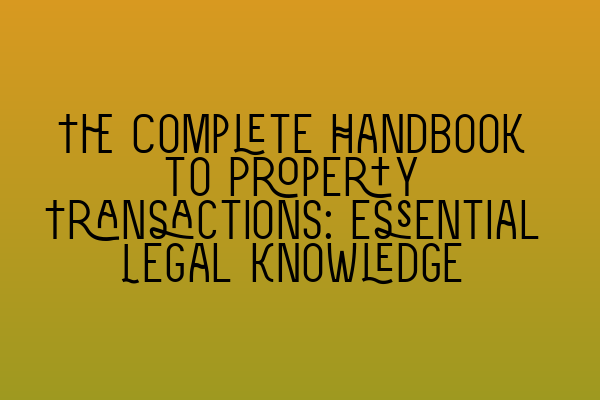Welcome to SQE Property Law & Land Law, where we provide comprehensive legal services for all your property transactions. Buying or selling a property can be a complex and daunting process, but with the right legal knowledge and guidance, it can be a smooth experience. In this complete handbook, we will walk you through the essential legal knowledge you need to know for a successful property transaction. So, let’s dive in!
1. Understanding the Conveyancing Process:
The first step is to understand the conveyancing process, which is the legal transfer of property ownership. It involves various stages, such as property search, title investigation, contract negotiation, and completion. To get a clear understanding of each step, we recommend reading our article on SQE 1 Practice Mocks FLK1 FLK2.
2. Importance of Property Surveys:
Before purchasing a property, it is crucial to conduct a property survey. A survey helps identify any structural issues or hidden defects that could impact the value or safety of the property. To learn more about property surveys and their importance, we suggest reading our related article on SQE 1 Practice Exam Questions.
3. Types of Property Ownership:
Understanding the different types of property ownership is vital for both buyers and sellers. From freehold to leasehold and shared ownership, each type has its own legal implications. To gain in-depth knowledge about the various types of property ownership, take a look at our informative article on SQE 2 Preparation Courses.
4. Navigating Mortgage and Financing:
When purchasing a property, many buyers rely on mortgage financing. Understanding the mortgage process, including types of mortgages, interest rates, and affordability, is crucial. We recommend checking out our article on SQE 1 Preparation Courses for comprehensive information on mortgage and financing.
5. Dealing with Contracts and Legal Documents:
Contracts play a vital role in property transactions. It’s essential to review and understand the terms and conditions outlined in them. Additionally, legal documents such as deeds, leases, and agreements should be carefully examined to ensure proper legal protection. For more guidance on contracts and legal documents, visit our article on SRA SQE Exam Dates.
6. Managing Property Searches:
Property searches are conducted to identify any potential issues or restrictions associated with a property, such as planning permissions, environmental concerns, or pending legal disputes. Understanding the importance of property searches and how to interpret the results is crucial. To learn more about property searches, read our comprehensive guide on the link provided in section 1.
7. Handling Land Registry and Transfer of Title:
When buying or selling a property, it is necessary to register the ownership with the Land Registry. Transfer of title involves legally transferring the ownership from the seller to the buyer. Our legal experts can guide you through the land registry process and ensure a smooth transfer of title.
8. Resolving Disputes and Legal Issues:
In some cases, property transactions may face disputes or legal issues that require resolution. This could involve boundary disputes, rights of way, or issues with planning permissions. Our team at SQE Property Law & Land Law has extensive experience in resolving such disputes and can provide legal assistance tailored to your needs.
By understanding the essential legal knowledge outlined above, you are better equipped to navigate the complexities of property transactions. At SQE Property Law & Land Law, we are here to support you throughout the process. If you have any questions or require professional legal advice, please do not hesitate to contact us.
Remember, having the right legal knowledge is crucial for a successful property transaction. Stay informed, stay prepared, and let SQE Property Law & Land Law be your trusted legal partner.
